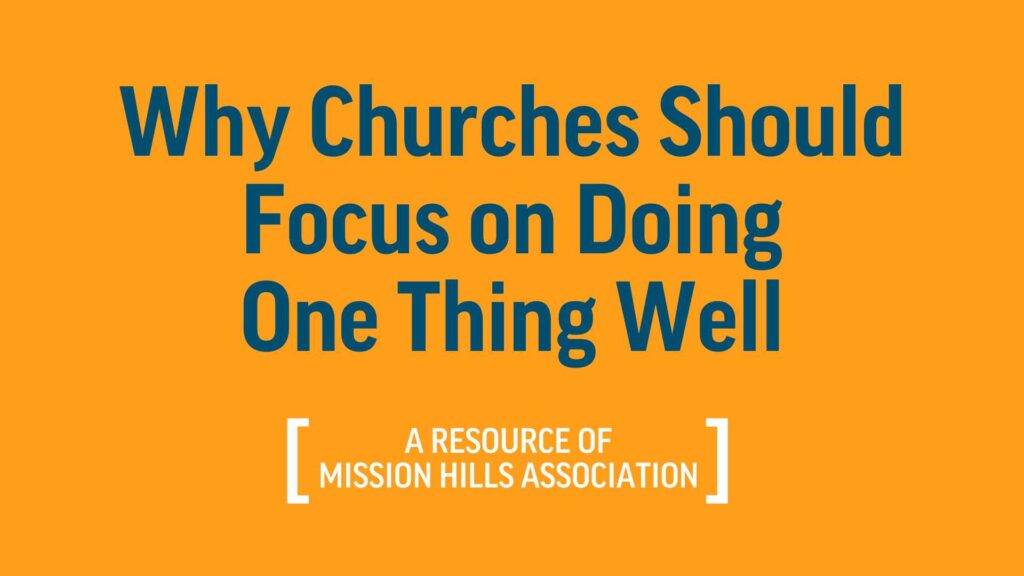
In an era of increasing cultural division, the importance of church unity has never been more apparent. This week, we explore the topic of effective church collaboration with Pastor Chris Flathers of Connect Church in Lone Tree, CO, who shares insights on building camaraderie among diverse congregations to reach the unchurched and nurture disciples across different houses of worship.
Connect Church, planted by Chris and his wife in the fall of 2019, was born out of a vision to connect the disconnected to a growing relationship with God. As lead pastor, Flathers has made it a priority to develop partnerships with other churches, transcending perceived denominational differences.
“As our culture becomes more divided, a united church spotlights Jesus,” Flathers emphasizes, highlighting one of the most central ideas of evangelism—shining Christ’s light to those who do not know him.
In his efforts to unite churches, Flathers identifies a common obstacle: the tendency to “gravitate towards what makes us different or what we are against.” However, he believes the key to successful collaboration lies not in focusing on differences but in finding common ground.
“We have to focus on what we are for as Christ’s church collectively,” Flathers explains. “We’ve got a lot more in common than we have different as followers of Jesus.” He adds, “At Connect Church, we believe Jesus really valued unity, so we should value unity. And by our unity, the watching world would actually see Jesus in us.”
Working together is crucial for successful ministry in today’s culture because, to the non-Christian world, our denominational discord and ministerial differences “just looks like a bunch of in-fighting, and it kind of is,” says Flathers. However, he emphasizes, “When we unite around what matters most, I believe that we’ll see more people come to know Jesus.”
We agree with Pastor Flathers. A unified approach not only strengthens the Christian witness but also amplifies Christ’s message through collective efforts. By embracing partnership as a core value, churches can work in harmony to fulfill their shared mission of making disciples and transforming communities.
Building Bridges: Strategies for Cross-Church Collaboration
The practice and outreach of collaboration between ministries can be a challenge. Pastor Chris shared some of the strategies Connect Church uses to build strong partnerships in their community.
1. Focus on Our Shared Values
A united Church can spotlight Jesus more effectively. The first step to achieving this unity is to focus on what your church may have in common with the church down the street rather than their differences.
“We have to focus on what we are for, collectively, together,” he explains, reminding us that as followers of Jesus, we share far more similarities than differences.
2. Embrace a Learner’s Heart and Walk Humbly
Humility is a cornerstone of effective collaboration, according to Flathers. He advises, “You have to walk in with the posture of a learner if you are seeking long-term collaboration.” This approach mirrors Jesus’ own humility and helps avoid the pitfalls of pride and competition between churches. Humility is not always easy in leadership so it takes consistent introspection and growth. Flathers says, “Humility is something I have to continually grow in myself, check my spirit in, and repent of when I get it wrong.”
Resist viewing other churches as enemies or competition; our true enemy is not the church down the street.
3. Publicly Celebrate God’s Work in Other Churches
One key strategy Flathers recommends for building positive relationships with other churches is celebrating their successes. He encourages church leaders to publicly recognize and applaud the wins of other organizations. Public acknowledgment models inclusive behavior and a collaborative attitude for your flock, and helps break down the barriers between congregations. This practice fosters a supportive ecosystem among churches, acknowledging that God gives different strengths to different churches and that we should rely on each other.
4. Encourage Connections Across Congregations
Collaboration isn’t just about leadership; it involves the entire church community. Flathers emphasizes the importance of encouraging church team members to form relationships across churches. This approach strengthens collaborative efforts at all levels and helps create a more interconnected Christian community. By fostering these connections, churches can work together more effectively to serve their communities and spread their shared message.
Connecting with other churches, even outside your denomination, aligns with the broader Christian mission, which is not about outperforming one another but rather working together to illuminate God’s light for those who have yet to see it. Such partnerships reflect a shared goal among churches to unite in their efforts to spread the gospel and serve their communities effectively.
5. Share Authentic Experiences in Ministry
In the spirit of genuine collaboration, Flathers advocates for sharing real insights rather than just presenting highlight reels. He encourages church leaders to resist the temptation to only showcase their successes. By being open about both triumphs and challenges, churches can build more authentic relationships and learn from one another’s experiences, ultimately strengthening their collective ministry efforts.
6. Measure Success by Heaven’s Standards
Flathers also cautions against relying too heavily on traditional church metrics. Instead, he encourages focusing on the true impact of ministry work rather than comparing numbers. This approach aligns more closely with God’s standards of success, emphasizing the quality of discipleship and community impact over quantitative measures.
By avoiding these comparisons, churches can collaborate more freely and focus on their shared mission of spreading God’s love.
The Impact of Church Collaboration
Church collaboration creates a powerful testimony to the world and fosters personal growth among leaders. United we can present a compelling picture of Christ’s love, serving as a powerful witness to non-believers.
Inter-church collaboration also enriches the lives of the ministers and church leaders who participate. As Flathers notes, “The friendships that I have and the ability to fellowship with others who get the difficulty of ministry is one of the most rewarding aspects of collaborating with other churches.”
This article was written in collaboration with Pastor Chris Flathers from Connect Church in Lone Tree, CO. If you want to continue the conversation, you can contact him directly at chris@connectchurch.community.




